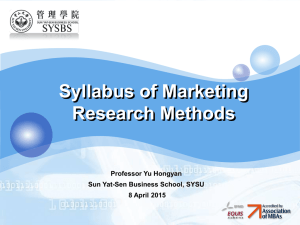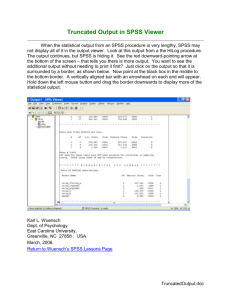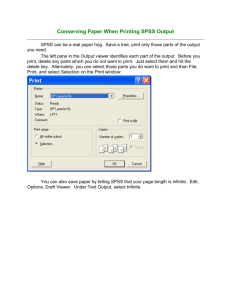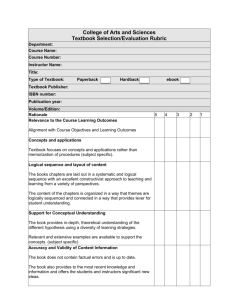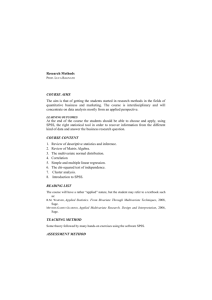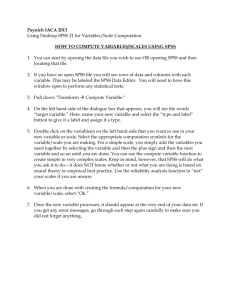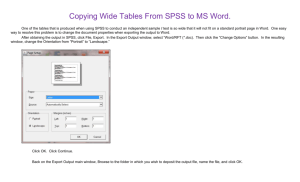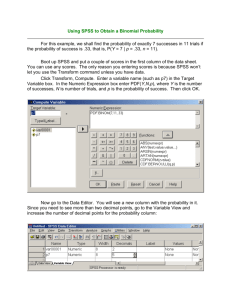Syllabus: Social Research Workshop
advertisement
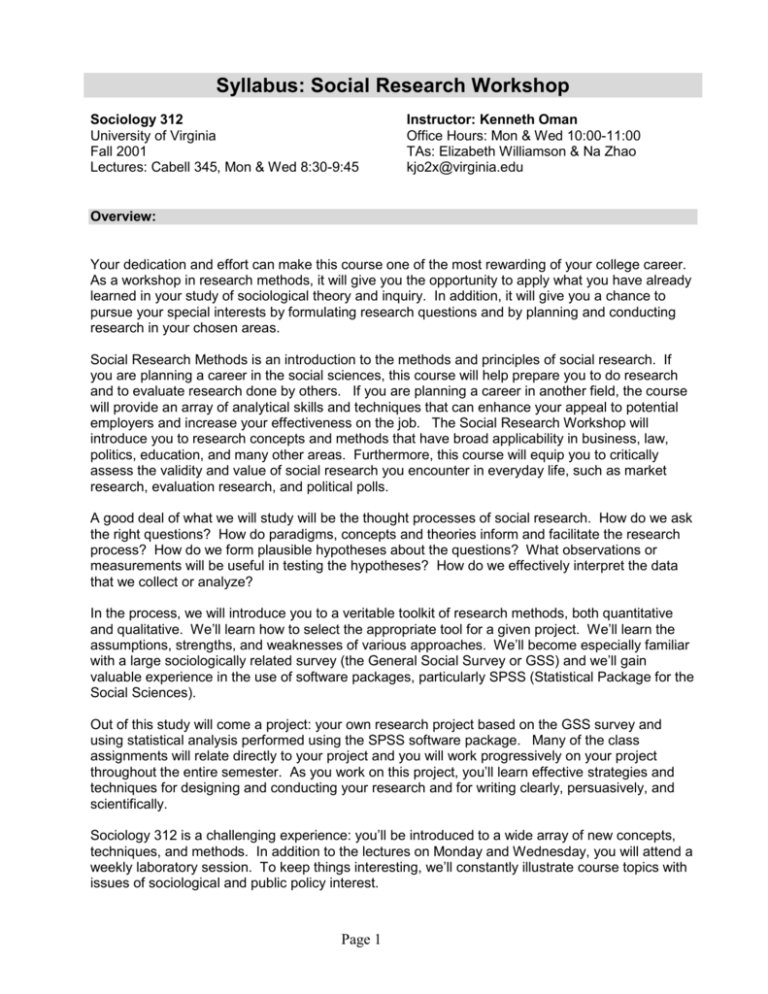
Syllabus: Social Research Workshop Sociology 312 University of Virginia Fall 2001 Lectures: Cabell 345, Mon & Wed 8:30-9:45 Instructor: Kenneth Oman Office Hours: Mon & Wed 10:00-11:00 TAs: Elizabeth Williamson & Na Zhao kjo2x@virginia.edu Overview: Your dedication and effort can make this course one of the most rewarding of your college career. As a workshop in research methods, it will give you the opportunity to apply what you have already learned in your study of sociological theory and inquiry. In addition, it will give you a chance to pursue your special interests by formulating research questions and by planning and conducting research in your chosen areas. Social Research Methods is an introduction to the methods and principles of social research. If you are planning a career in the social sciences, this course will help prepare you to do research and to evaluate research done by others. If you are planning a career in another field, the course will provide an array of analytical skills and techniques that can enhance your appeal to potential employers and increase your effectiveness on the job. The Social Research Workshop will introduce you to research concepts and methods that have broad applicability in business, law, politics, education, and many other areas. Furthermore, this course will equip you to critically assess the validity and value of social research you encounter in everyday life, such as market research, evaluation research, and political polls. A good deal of what we will study will be the thought processes of social research. How do we ask the right questions? How do paradigms, concepts and theories inform and facilitate the research process? How do we form plausible hypotheses about the questions? What observations or measurements will be useful in testing the hypotheses? How do we effectively interpret the data that we collect or analyze? In the process, we will introduce you to a veritable toolkit of research methods, both quantitative and qualitative. We’ll learn how to select the appropriate tool for a given project. We’ll learn the assumptions, strengths, and weaknesses of various approaches. We’ll become especially familiar with a large sociologically related survey (the General Social Survey or GSS) and we’ll gain valuable experience in the use of software packages, particularly SPSS (Statistical Package for the Social Sciences). Out of this study will come a project: your own research project based on the GSS survey and using statistical analysis performed using the SPSS software package. Many of the class assignments will relate directly to your project and you will work progressively on your project throughout the entire semester. As you work on this project, you’ll learn effective strategies and techniques for designing and conducting your research and for writing clearly, persuasively, and scientifically. Sociology 312 is a challenging experience: you’ll be introduced to a wide array of new concepts, techniques, and methods. In addition to the lectures on Monday and Wednesday, you will attend a weekly laboratory session. To keep things interesting, we’ll constantly illustrate course topics with issues of sociological and public policy interest. Page 1 Social Research Workshop Sociology 312 Fall 2001 Syllabus As your instructor, I’m committed to helping you make this a worthwhile experience. Don’t hesitate to ask me and your TA questions, send me emails about your project, or take advantage of special exam review sessions. We want to help you meet your goals in this course. Revisions: The course syllabus is subject to revision. Please check the Instructional Toolkit for the current version. This version is dated 8/16/01. Textbooks (required): Babbie, Earl. 2001. The Practice of Social Research (9th Edition). Wadsworth. Wagenaar, Theodore & Earl Babbie. 2001. Practicing Social Research (9th Edition). Wadsworth. Babbie, Earl; Fred Halley & Jeanne Zaino. 2000. Adventures in Social Research (For use with SPSS Base 9.0 and 10.0). Pine Forge Press. The primary textbook is The Practice of Social Research. Wagenaar/Babbie offers activities and study help for the textbook. Adventures in Social Research provides an introduction to SPSS (the statistical software package) and the GSS (General Social Survey). We’ll use it extensively in our laboratory sessions. General Policies: Prerequisites: Sociology 311 except by special permission of the instructor. Attendance Requirements: Attendance is required at all lectures and laboratory sessions. Attendance will be taken and factored into the laboratory participation segments of the grade. If an emergency forces an absence, contact the instructor (in advanced if possible) by email. Grading: Weekly homework Weekly labs Midterm Final Exam Research Project 25% 10% 20% 25% 20% Assignments and research projects that are handed in late will be subject to a grading penalty. Generally, the penalty will be 10% of the maximum score for each week they are late. Honor System: Page 2 Social Research Workshop Sociology 312 Fall 2001 Syllabus Group review and study is encouraged for lecture topics and SPSS skills. The analysis of data, interpretation, and writing of your research project must be your work alone. You will be asked to “pledge” all exams, assignments, and papers. Laboratory Sessions: There is a weekly lab session associated with this course. Attendance is required. Your TA will assign a grade for your performance in the lab sessions. Out of courtesy to the instructor and the other students, do not use your workstation during laboratory sessions unless directed to do so by the instructor. Unrelated software (i.e. word processing, instant messaging, Internet browsers, etc.) should only be used when required for laboratory exercises. Course Schedule The Logic of Scientific Inquiry 1. Introduction to Scientific Inquiry Week of September 3 Read Babbie (textbook) Chapter 1 Read Babbie and Halley (SPSS book) Chapter 1 2. Social Research and Social Theory Week of September 10 Read textbook Chapter 2 Read SPSS book Chapter 2 3. Causality Week of September 17 Read textbook Chapter 3 Read SPSS book Chapter 3 The Structure of Inquiry 4. Research Design Week of September 24 Read textbook Chapter 4 Read SPSS book Chapters 4 and 5 5. Conceptualization, Measurement, and Operationalization Week of October 1 Page 3 Social Research Workshop Sociology 312 Fall 2001 Syllabus Read textbook Chapters 5 Read SPSS book Chapters 6 - 8 Midterm Exam October 10 Fall Break October 13-16 6. Quantifying Information: Scales and Indices Week of October 15 Read textbook Chapters 6 and 14 Read SPSS book Chapters 9 & 10 7. Scientific Sampling Week of October 22 Read textbook Chapter 7 Strategies of Social Research 8. Univariate & Bivariate Analysis Week of October 29 Read textbook Chapters 15 & 17 Read SPSS book Chapters 13 - 15 9. Multivariate Analysis – the Elaboration Model Week of November 5 Read textbook Chapter 16 Read SPSS book Chapters 17 & 19 10. Experiments Week of November 12 Read textbook Chapters 8 and 18 Read SPSS book Chapter 11 11. Survey Research Week of November 19 Read textbook Chapter 9 Read SPSS Book Chapter 12 Thanksgiving Break November 21 - 25 Page 4 Social Research Workshop Sociology 312 Fall 2001 Syllabus 12. Qualitative Research Week of November 26 Read textbook Chapter 10 13. Unobtrusive Measures & Evaluation Research Week of December 3 Read textbook Chapters 11 & 12 Research Paper Due December 7 Final Exam (in Cabell 345) December 11, 2:00 PM Page 5
